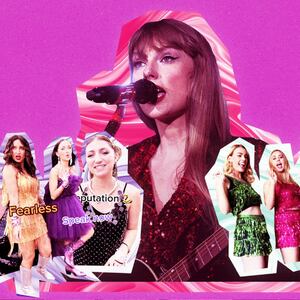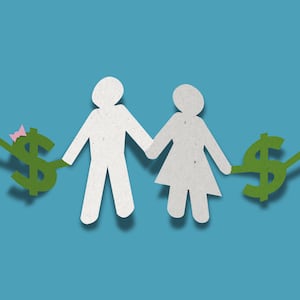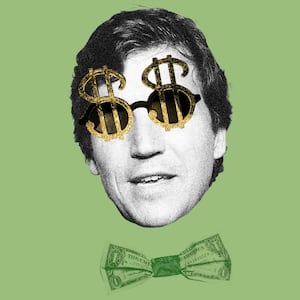Every year, the Met Gala’s celebration of opulence and fashion history is prone to ridicule. This year’s event, which honors the creative genius of Karl Lagerfeld—and happens to fall on International Workers’ Day—is no exception. Left unsaid about Lagerfeld, who I worked with regularly as a model, will be any mention of his problematic (and well-documented) attitude toward women and the primarily young, female workforce who helped make his clothes famous: models.
Let’s review.
Lagerfeld, whose prolific career included leading Fendi, Chanel, and his own eponymous brand, body-shamed women on multiple occasions. He once said those concerned with the extreme thinness of models were “fat mummies sitting with their bags of crisps in front of the television)" href="https://urldefense.com/v3/__https://www.cnn.com/style/article/karl-lagerfeld-controversial-quotes-intl/index.html__;!!LsXw!RZskHKNMzj5NXsdJQu8iB0LlYLD3Glf-cc5X4moQhLgoiFSjrOWSZGB7th5TYGCs5YzdpaKE1FHWF8CXXlyQoFnNZfTa$">“fat mummies sitting with their bags of crisps in front of the television.”
One of his most egregious comments was at the height of the #MeToo movement. In a stunning reveal of his own ignorance, he said he was shocked that “starlets” took “20 years to remember what happened”—as though trauma, stigma, and fear of retaliation weren’t preventing victims from speaking up. And in the world according to Lagerfeld, “If you don't want your pants pulled about, don't become a model! Join a nunnery, there'll always be a place for you in the convent. They're recruiting, even!"
Models who came forward about their abuse were labeled by Lagerfeld as “stupid,” “toxic,” and “sordid creatures.” If his comments weren’t enough, he showed how he really perceived models speaking out with his infamous faux feminist show, displaying models carrying vapid, nonsensical protest signs)" href="https://urldefense.com/v3/__https://time.com/3449319/chanel-feminist-protest/__;!!LsXw!RZskHKNMzj5NXsdJQu8iB0LlYLD3Glf-cc5X4moQhLgoiFSjrOWSZGB7th5TYGCs5YzdpaKE1FHWF8CXXlyQoJdHyGdU$">infamous faux feminist show, displaying models carrying vapid, nonsensical protest signs—mocking the very real problem that models, despite being the faces of the industry, have historically had no voice within it.
The dissonance of an industry that claims to be progressive (ostensibly celebrating body positivity and survivors) and then reveres figures like Lagerfeld without even acknowledging their regressive views, perfectly encapsulates the problem.
In the decade since I founded the Model Alliance, we’ve made some progress in creating a safer fashion industry for workers. The Model Alliance worked to pass the Child Model Act (extending existing labor protections to child models in New York), the Talent Protections Act in California (providing educational materials to talent on sexual harassment and eating disorders), and the landmark Adult Survivors Act (which opened a civil lookback window for survivors who were over 18 at the time of the abuse and outside the statute of limitations in New York).
But demeaning treatment and pervasive conditions of sexual harassment and abuse continue to plague the fashion industry, especially in the four decades since modeling agencies began using a legal loophole in New York to evade accountability. Not only must the people who enable these conditions be held accountable, but we must also enact systemic change in the industry.
The Fashion Workers Act—the culmination of the Model Alliance’s efforts over the last 10 years—would do just that, by bringing model management companies into regulation for the first time. The bill would forbid bad behavior that is so pervasive in the fashion industry, such as prohibiting talent from seeing their contracts with their clients, serving as their landlord and charging them far above market value to be squeezed four to a room into a two-bedroom apartment, and making models take out loans with interest from the agency instead of paying them in a timely manner.
Currently, models are locked into exclusive auto-renewing contracts with agencies that claim to have no obligation to book them work, while models often spend months—even years —tracking down their earnings. Those who speak out can face consequences, including being blacklisted by their agencies—the very people who are supposed to represent their interests.
Because of this lack of financial transparency, our industry is rife with sexual abuse. Workers are told to be grateful or they can easily be replaced, and without knowing when their next paycheck will come or how much it’ll amount to, they can’t afford to say “no” or be branded as “difficult.”
It’s no coincidence that the major predators we associate with the #MeToo movement—Bill Cosby, Jeffrey Epstein and Harvey Weinstein—used modeling agencies to prey on future victims.
The fashion industry should be a place where creativity and self-expression flourish, and where everyone is treated with dignity and respect on the job. We unfortunately have a long way to go as we continue to glorify figures like Lagerfeld—who despite his many talents leading brands—seemed to care more about models' aesthetic value than their rights as workers supporting an industry that brings in $600 million annually for New York State from just Fashion Week alone)" href="https://urldefense.com/v3/__https://www.jec.senate.gov/public/_cache/files/39201d61-aec8-4458-80e8-2fe26ee8a31e/economic-impact-of-the-fashion-industry.pdf__;!!LsXw!RZskHKNMzj5NXsdJQu8iB0LlYLD3Glf-cc5X4moQhLgoiFSjrOWSZGB7th5TYGCs5YzdpaKE1FHWF8CXXlyQoBdyZKIs$">that brings in $600 million annually for New York State from just Fashion Week alone. That’s why Albany lawmakers must pass the Fashion Workers Act this session.








